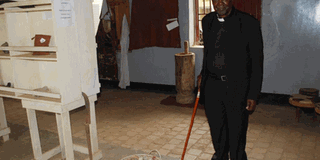Anatooli Wasswa: The priest turned herbalist

Anatooli Wasswa at one of his clinics on Mutukula Road near Buyambi Stage in Kyotera District. Photos by IVAN KIMBOWA
Anatooli Wasswa, 90, a priest from Bannakalooli Brothers church in Kiteredde, Kyotera District is not your ordinary priest.
He is a herbalist at St Luke’s Uganda Herbal Clinic that sits in the middle of a two acre artificial forest on Mutukula Road near Buyambi Stage in Kyotera District.
The clinic is a cultural museum of sorts with different fetishes placed strategically in different corners.
Anatooli was inspired into herbal medicine as a result of a heart attack experience that troubled him during childhood.
“I used to suffer a heart attack as a result of low blood pressure. However, Brother Joseph Balikuddembe gave me different herbal concoctions which cured it,” he says.
The recovery inspired him into making deeper research working with Sister Rosalina at Bwanda and later Pereperine Perinate, a French white father, who gave him guidelines on proper formulas and mixing herbal medicine.
His works were given more weight when, during the fifth Synod of Masaka Diocese, the church suggested that Anatooli leads the team to heal God’s people using herbal medicine.
This was the start of the journey that saw him establish St Luke Uganda Herbal Clinic before forming two other branches in Kibuye, Kampala and another in Nyamitanga, Mbarara District.
“Members [of the Synod] wanted me to promote herbal medicine but there was the challenge of perception since religion and educated people associate herbal medicine with satanic beliefs,” he says.
However, he says, herbal medicine has no any close association with witchcraft and he has used the platform he has to fight con herbalists, who use unacceptable conditions to offer treatment for different ailments.
“People who pick herbs call themselves doctors. Those who operate from shrines, call themselves doctors. These are liars discrediting herbal medicine,” he says.
According to Anatooli, with permission from the Masaka Diocese, he exorcises and has managed to dispel the popular belief that there are dark forces through which spirits speak.
“These are just tricks used by unscrupulous people to con others,” he says, before revealing that he has managed to collect different fetishes from shrines to enlighten people against con artists.
The museum
Inside the museum, a well arranged shelf offers a good view of the fetishes with brief explanations of how con artists use them.
Among the fetishes are needles, moon curved knives, smoking pipes and traditional bowls, among others.
Most of these are designed in a manner that many people associate with witchcraft.
In another room is a reserved exhibition area where Anatooli takes people through different tricks that witch doctors use to fleece people.
According to Cathy Nakayita, the St Luke Uganda Herbal Clinic secretary and museum tour guide, the forest at the clinic has plenty of herbal medicine.
The herbs, she says, treat a number of ailments including malaria, cough and some terminal illnesses.
Anatooli has been recognised for his work with the most recent recognition coming in form of a medal from President Museveni for promoting the use of herbal medicine.
About Anatoli Wasswa
He was born in Singo County, Kigo village in 1927. In 1941 he started school before moving to Kiteredde in Kyotera District to become a seminarian. In 1948, he became a Brother before enrolling in Busubizi Teachers Training College in Mityana, to study teaching. He also served an accountant at the Congregation of Bannakaloli Brothers for 12 years. He was ordained a priest at Katigondo in 1978, becoming a Father. He has written a number of books including: Unveiling witchcraft, which tells of the secret world of sorcery.




